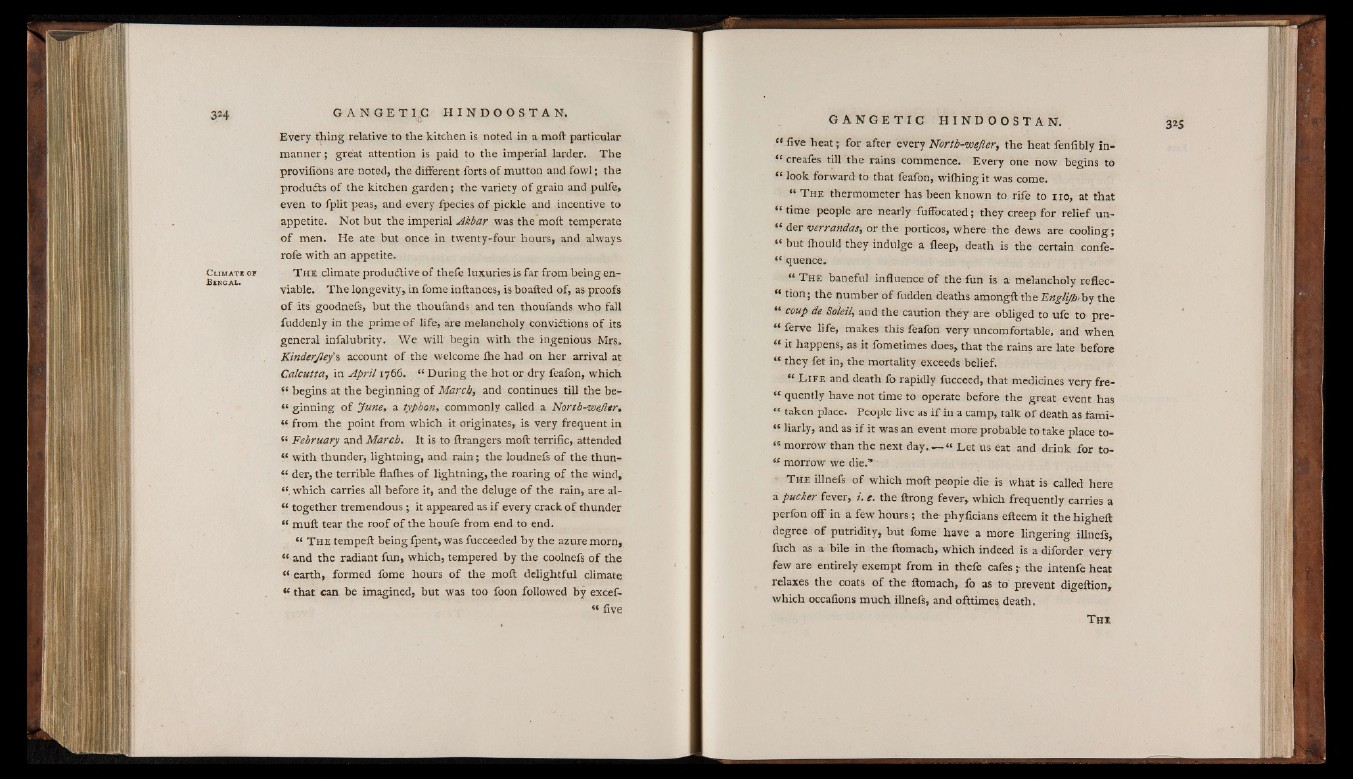
C l i m a t e o p
B e n g a l .
Every thing relative to the kitchen is noted in a moft particular
manner; great attention is paid to the imperial larder. The
proviiions are noted, the different forts of mutton and fowl; the
produits of the kitchen garden; the variety of grain and pulfe,
even to fplit peas, and every fpecies o f pickle and incentive to
appetite. Not but the imperial Akbar was the moft temperate
o f men. He ate but once in twenty-four hours, and always
rofe with an appetite.
T h e climate productive of thefe luxuries is far from being enviable.
The longevity, in fome inftances, is boafted of, as proofs
of its goodnefs, but the thoufands and ten thoufands who fall
fuddenly in the prime o f life, are melancholy Convictions of its
general infalubrity. We will begin with the ingenious Mrs.
Kinderjley's account of the welcome fhe had on her arrival at
Calcutta, in April 1766. “ During the hot or dry feafon, which
}• begins at the beginning of March, and continues till the be-
“ ginning of June, a, typhon, commonly called a North-wejler,
“ from the point from which it originates, is very frequent in
jf February and March. It is to ftrangers moft terrific, attended
“ with thunder, lightning, and rain; the loudnefs o f the thun-
“ der, the terrible flafhes of lightning, the roaring of the wind,
H which carries all before it, and the deluge of the rain, are al-
“ together tremendous ; it appeared as i f every crack of thunder
“ muft tear the roof o f the houfe from end to end.
“ T he tempeft being fpent, was fucceeded by the azure morn*
“ and the radiant fun, which, tempered by the coolnefs o f the
“ earth, formed fome hours o f the moft delightful climate
“ that can be imagined, but was too foon followed by excef-
“ five
“ five heat; for after every North-wejler, the heat fenfibly in-
“ creafes till the rains commence. Every one now begins to
“ look forward to that feafon, wiihing.it was come.
“ T he thermometer has been known to rife to n o , at that
“ time people are nearly fuffocated; they creep for relief un-
i£ der verrandas, or the porticos, where the dews are cooling ;
“ but Ihould they indulge a fleep, death is the certain confe-
“ quence.
“ The baneful influence o f the fun is a melancholy reflec-
“ tion; the number o f fudden deaths amongft the Fnglijh< by the
“ coup de Soieil, and the caution they are obliged to ufe to pre-
“ ferve life, makes this feafon very uncomfortable, and when
“ it happens, as it fometimes does, that the rains are late before
“ they fet in, the mortality exceeds belief.
“ L ife and death fo rapidly fucceed, that medicines very fre-
“ quently have not time to operate before the great event has
“ taken place. People live as i f in a camp, talk of death as fami-
“ liarly, and as i f it was an event more probable to take place to-
“ morrow than the next day. — “ Let us eat and drink for to-
“ morrow we die.”
The illnefs o f which moft peopie die is what is called here
a pucker fever, L e. the ftrong fever,, which frequently carries a
perfon off in a few hours ; the phyficians efteem it the higheft
degree o f putridity, but fome have a more lingering illnefs,
fuch as a bile in the ftomach, which indeed is a diforder very
few are entirely exempt from in thefe cafes; the intenfe heat
relaxes the coats o f the ftomach, fo as to prevent digeftion,
which occafions much illnefs, and ofttimes death.
T h*